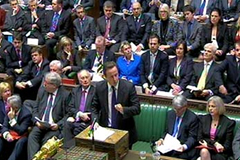The overwhelming analysis of George Osborne’s latest budget has surrounded the planned changes to welfare spend, with an inevitable focus on the scrapping of working tax credits, the introduction of a ‘living wage’ and an ambition to make everyone who is under the age of 25 continue in education, get an apprenticeship or find a job!
By and large, the political classes have split into the traditional left-right fashion to which we have become accustomed, with Labour screaming ‘foul’ and Tories claiming that they are only doing what has been asked for by an increasingly weary debt ridden electorate.
Politically all this has played out very well for the chancellor, as he has been able to concentrate on the savings to the government and UK Plc, accrued on the back of those he claims are overly reliant on ‘hand outs’ – rather than addressing the very real challenges that the business community is about to face in trying to pay for those savings.
I was a long-time advocate of the minimum wage and my instinct is to be equally supportive of the introduction of a living wage. Indeed it is something that we practice at Downtown and we are pleased to be able to do so.
However, I am equally aware of the pressure many small businesses face when thinking about rewarding good staff in order to retain them through pay increases; the challenges they still face in terms of cash flow and dealing with their banks; the masses of red tape and bureaucracy they have to plough through; and negotiating with an increasingly aggressive HMRC.
To have to facto in additional salary costs at a time when many are still replenishing their own bank balances having come through a tough and lengthy recession hardly feels ‘business-friendly’.
There is then, of course, the ticking time bomb of the introduction of the new auto enrolment pension provision – a further cost to business, and one that many will not have adequately planned for or, sadly, be able to afford.
The net result of these demands on business may not be wholesale bankruptcies, closures and redundancies. However, I believe it will prove to be a barrier to growth. Those who have a vision of growing their business by employing more staff will be thinking twice and possibly three times before agreeing to an expenditure bill that is going to be so much higher in eighteen months’ time.
Of course, people will point to the reduction in corporation tax and indeed personal tax allowances too. Unfortunately, many of the smaller businesses and business owners that operate in the UK will benefit little from these changes.
George may have been unkind to the working poor. He has done few favours for the working entrepreneur either.
The budget may be positive for the chancellor in the short term. I wonder whether the impact of that budget in the longer term and the ultimate judgement of it will be quite as kind.







